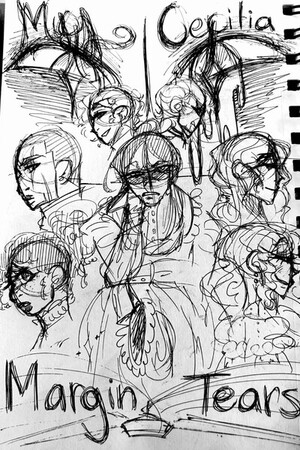Chapter 8:
The Edge of the World
Margin Tears: My Cecilia
Storming out of the oak double doors of the manor, Cecilia paused at the base of its steps, her hands clutched tight in her apron as she spared a taut glance backward. The house loomed behind her, vast and silent, its many windows glimmering like watchful eyes. The air seemed to hold its breath. She clicked her tongue, grimacing as she forced herself not to glance back a second time and pressed forward.
The gravel path wound into the treeline, and she followed it, skirts brushing low branches, shoes crunching against stones. At first, the forest appeared harmless enough—an ordinary tangle of oaks and pines, their leaves rustling gently overhead from gentle, whistling winds. Through the tumultuous storm of emotions thrashing in her mind and chest, Cecilia tried to take inspiration from the calm of the outdoors. She clung to the hope that arose from her own rhythmic footsteps, from the thought that each step carried her further away from the suffocating corridors of the house and toward anything else.
Yet as she walked, the soft crunch of jagged stone and crumbled dirt underfoot, the sound of her own footfalls became strangely loud. The forest gave nothing back to her—no birdsong, no humming insects, no rustles in the undergrowth. It was as though every living thing had retreated, as if it were lifeless entirely. The silence was not peace but absence, a void into which her breathing tumbled too loud and heavy.
A chill coiled up her spine, slowly spiraling up its length. She walked faster.
She pressed on, relentless, determined, ragged. The gates had to be near—they had to be—yet the minutes bled together, building into what had to be an hour, even multiple, there was no doubt. Yet when she glanced up to the sky, the pale sun lorded over her in the same position it had been in since her journey began.
No shadow shifted. Time did not advance.
Sweat gathered at her brow, her legs ached, but the forest remained unchanged. Trunks stood in endless repetition, each the same width, the same darkened bark, their patterns swirling and cragged. The path did not narrow, did not curve, did not break. When she finally looked behind her, there was nothing but more of the same trees; there was not even a speck of the manor in the distance, as though it had been swallowed whole.
She should not have looked back, panic sinking its needlelike claws into her, hope turning into desperation as she lurched forward in pursuit again. The deeper she pressed, the less the forest seemed to belong to the world she knew. Details blurred. The ridges of bark smoothed into pillars of smooth, endless black, their surfaces featureless and unknowable. Leaves melted into indistinct blotches, blotches into shadows, shadows into that same black, black, undefinable black. Soon the trees were only silhouettes against a deeper mimicry of a living world.
She slowed, her breath catching. She felt as though she were walking inside a void, a space where everything was nothing, the nothing containing everything in turn. The air no longer smelled of earth or moss, not even the distant remnants of laundry soap and chimney smoke—indeed, it smelled of nothing at all. Even the ground beneath her feet lost substance, the crunch of gravel and give of muck fading until her shoes met a surface too smooth, too silent.
Cecilia lifted a trembling hand to the nearest tree. Her fingers expected roughness, prayed for it, but instead it touched something unnaturally cold, slick as polished glass. She snatched her hand back as if it burned her.
She would rather it had, that it were burning or freezing or doing anything at all to prove it was real.
The forest was wrong—it was not dead, but it was not any kind of living either. It was purely unmade, dissolving into some deeper darkness.
Her pace quickened, half from desperation, half from dread. The path stretched endlessly ahead, yet it did not feel like progress. Instead, the trees—whatever remained of them—seemed to lean closer, though they did not move; the shadows seemed to gather, though the sun did not shift. It was as though the forest bent inward, spiraling her not outward to freedom, but deeper into the manor’s shadow.
Nothing could be proven real or true. It was all guesswork, her mind’s attempt at comfort by finding some stability of definition.
A whisper slid across her ear. Not words, but the faint suggestion of sound, as though the air itself had formed a mouth. She clamped her hands over her ears and stumbled forward. The silence returned, but now it seemed to watch her.
It made her sick, stomach as unsteady as her feet. Her steps faltered. Panic gnawed at her reason, and Cecilia’s fingernails dug into her scalp, clutching at the roots of her hair for stability. What if she was already lost—what if she had been walking in circles, the manor still behind her, always just out of sight? What if the forest was endless, not because of its size, but because it was not real at all?
With a strangled gasp, Cecilia turned and fled back the way she came. She expected another eternity of walking, an eternal punishment for a daring attempt at abandonment, yet within only minutes, the world changed. The shadows loosened, details returned, and through the thinning trees, she glimpsed pale stone.
The manor rose before her again, as though it had been waiting. The tower cut into the sky, sharp and mocking, the ivy spilling down its walls like veins. The whole house seemed to lean forward slightly, not physically, but with a weight of presence—as if it had drawn her back by some invisible tether.
She heaved; it took every bit of remaining strength in her not to cry. It was as beautiful as it was awful.
Cecilia staggered to the lawn, clutching her chest, her lungs burning. She looked back at the forest. It seemed ordinary again, no different from what she had seen in glimpses through windows throughout the morning and afternoon—green, tranquil, unassuming.
She knew better now. The forest was not a way out but a snare, a living labyrinth that shifted at the will of the manor itself.
The truth settled on her like frost, sticky and penetrating: She could not leave by foot. She doubted she would be able by any physical means. The manor would not allow it.
And as she stood beneath its shadow, she felt the dreadful certainty that it was not she who had turned back; her exit was nothing more than a tantrum to wait out until her senses returned. No, it was the forest itself that had delivered her, obedient, into expectant hands.
…
The moment Cecilia stepped across the threshold, the air inside the manor seemed to shift. It was cooler, stiller, as though the very walls had drawn a breath of relief at her return. She pressed her back to the great door and her hands to her face, trying to steady her ragged breathing, yet her heart thundered like she was still running.
After a number of deep, catching breaths, she spread her fingers to peek between and around the entry hall. It was the same as always—polished floors reflecting the dim light of chandeliers, portraits staring down with painted solemnity, a staircase sweeping upward in a graceful arc. Yet there was something in the silence now that pressed on her more heavily than the forest had.
It was not emptiness. It was attention.
Pushing herself off of the oaken surface, Cecilia moved slowly into the hall, her footsteps echoing too loudly, ricocheting across the walls, floors, and ceilings into the guts of the house. Her mind clawed at possible explanations as she ambled deeper in, desperate for anything to stably dig into as her arms hugged around her.
Perhaps she had walked in circles. Perhaps she had become dizzy and lost her bearings in her tremor. Perhaps there was some bizarre hallucinogen in the woodland air that took root in her sinuses, into her brain. They were explanations from shaky to nonsensical, but it had to be something explainable. If it was not, then an even worse answer presented itself—The forest had not merely been disorienting. It had been dissolving, unraveling itself around her, guiding her like a sheep with an invisible crook.
She paused beneath one of the tall arched windows. The sky beyond was a bright cerulean sea, the same shiny ball of sun still suspended above the horizon. Her reflection in the glass looked pale and ghostlike, her wide eyes rimmed with fear that the crooked frames of her glasses could not mask. She raised her hand, half expecting the pane to ripple beneath her touch the way the trees had, but it was only glass, cool and solid.
Cecilia shuddered. It was not the forest that guided her; that was merely a part of a larger whole. It was the house, the manor, whatever or whoever kept it all together that wanted her kept in place.
She retched. Bent at the waist, hands on her knees, it took a minute for her stomach to settle and her arm to wipe her cold-wet lips. The acidic bile scratched the back of her throat with a burn that somehow felt grounding in such a whirlwind.
The thought lodged itself in her like a splinter, impossible to ignore. She remembered how quickly her return had been, as though the forest itself had bent and folded back upon the manor to deposit her where she belonged. The walls had not trapped her through locks or chains—they had let the very land morph, fold, and twist into a jail she could not even comprehend enough to fight.
Her gaze lifted to the portraits. The painted eyes of ancestors and strangers seemed sharper than before, their irises gleaming faintly in the candlelight. She had not looked closely before, kept too busy to pay too much attention. But the more she looked, the less she took in. They had faces and dressings, she assumed, but the moment she blinked or looked to another portrait, any defining features immediately left her mind, as if the canvas was blank from the start.
The manor was not merely a house. It was a body, a will, a presence. It could bend the woods, distort time, and cradle its inhabitants within its reach. She had not been lost; she had been tested, perhaps even toyed with.
Cecilia pressed her palms together, nails digging into her skin. Fear trembled inside her, but beneath it stirred something else—anger. “I should be afraid,” she muttered. “It, you, whatever this all is, wants me to be afraid, to be small and accept I can’t leave.”
The silence of the hall deepened, as though the house were listening, reveling in what it knew was her inevitable return.
Cecilia’s eyes raised to the largest portrait in the hall, gilded and pristine under the pale sun’s rays.
Olrin Caine.
Cecilia straightened her shoulders, though her knees still trembled. She would have to play its game for now. She would have to watch, and wait, and learn. But inside, deep inside where the house could not delve in and change her, she vowed that she would not be its prey forever.
If the manor was alive, then it had limits. It could be outwitted. There were weaknesses somewhere. And Cecilia would find them.
Her glare scrawled across the walls, scanning to where she had frisbeed the sherry a short, long while ago. Not that anyone would have ever guessed, as there was no evidence of any damage done. No sharp scent of anger and alcohol, no cracked crystal, no dents in the wall or tears in the wallpaper—As if nothing had ever happened.
Sharp black eyes dragged back to meet Olrin’s painted eyes, smug and leering.
With snarling lips, she spun on her heel, ponytail swinging behind her as she progressed once again into whatever awaited in the domestic depths.
Yet as she moved deeper into the house, the weight of unseen eyes pressed upon her still, a reminder—The manor listened, it responded, and it was patient.




Please sign in to leave a comment.